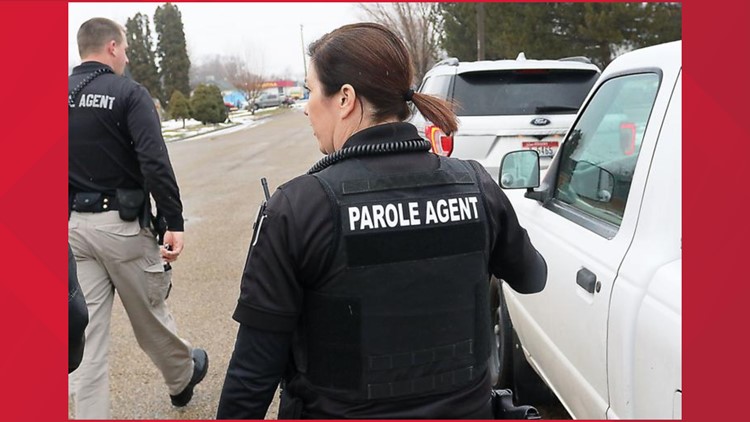BOISE, Idaho — Chris Thomas gave back to his community after he was released from prison to parole in 2015. Then 41, the Boise resident wanted to help people who, like himself, had battled drug addiction throughout their lives. He worked for Supportive Housing and Innovative Partnerships in Boise, and helped put together a campaign raising awareness about overdose and abuse of prescription medications. He helped organize the 2016 Rally for Recovery at the Idaho Capitol. He opened his own business. He was doing better, staying clean, and paying the $60 per month parolees in Idaho pay for their supervision.
But in 2016, one of his friends and mentors, who also worked at SHIP, had a heart attack and stroke. While it was devastating for Thomas on a personal level, it also added to his stress at work, because it meant he had to take over some of her duties as well.
In the midst of it all, he started using drugs again. Eventually, in 2018, the Idaho Commission of Pardons and Parole revoked his parole.
When they did, commissioners chose not to give Thomas credit for the time he served on parole — even the time during which he avoided drugs and complied with the terms of his supervision. Instead, the commission added that time — known colloquially as “street time” — onto the end of his sentence, meaning he would have to serve it all over again, either on parole or in prison. It amounted to the commission re-sentencing him, Thomas argues.
“And it was like, ‘Well, what was the point of doing good, and doing all this stuff?’” Thomas said. “Yes, I did struggle, I get that. But I also really tried to make a difference in my community.”
Yet Thomas’ case isn’t unheard of. The seven-member commission, made up of members appointed by the governor for three-year terms, often declines to give a person credit for the time they spent in the community, if commissioners choose to revoke parole.
Last year, the commission made 1,064 revocation decisions — and in 125, or 11.7%, of those cases, the commission didn’t grant credit for any street time, according to Ashley Dowell, executive director for the commission. It’s not unusual for the commission to take away years a person served on parole. Over the past five years, the commission has made 3,916 parole revocation decisions, and 2,996 of those decisions included credit for street time; another 920 included no credit for street time, according to Dowell.
Dowell cited state code stating that a person’s street time is presumed to be forfeited if a person violates parole, but granting the commission the discretion to award credit for street time if they so choose. She wrote in an email to the Idaho Press that “statutorily forfeiture of time is at the discretion of the Commission.”
Still, the practice of forfeiting street time has drawn criticism from some, such as the American Civil Liberties Union of Idaho, and spawned at least three legal actions in the past 40 years, but each time courts have ruled the commission is within its statutory authority to make those decisions.
At a time when Idaho’s prisons are so overcrowded the state is likely to send more than 1,000 inmates to a private prison in Colorado, Thomas questioned the practice of not giving people credit for the parole time they serve.
“Sending 1,000 people to Colorado when they could just let people out is ridiculous,” he said.
Kathy Griesmyer, public policy analyst for the ACLU of Idaho, wrote in an email to the Idaho Press that her organization is opposed to the practice “as it disregards positive time spent in the community and keep folks in prison longer than needed.”
Thomas estimates he served about two years of parole in the community he won’t receive credit for. Now he’s on schedule to be done with the system in 2022.
But other people have had to forfeit even more time. Thomas has heard of people forfeiting as many as seven years spent on parole. In 1989, the Idaho Court of Appeals considered the case of Archie Winter, a man who had been sentenced to 10 years for burglary in 1976. He was paroled four times, and each time he violated parole through alcohol-related violations. By his fourth return to prison for the charge in 1987, Winter had served about five years in confinement and six years on unsuccessful parole, according to the court’s decision.
Because 11 years had passed since the start of his 10-year sentence, Winter believed he’d served his time. The court disagreed and cited Idaho Code 20-228, which requires a person who violates parole to “serve out his sentence, and the time during which such prisoner was out on parole shall not be deemed a part thereof.”
It’s the same statute Dowell referenced in her email to the Idaho Press, and the same one the court had cited in 1985 when it considered the question of whether the parole board could revoke street time in the case of Gilbert Flores, who had been sentenced to a 10-year term in 1977 for manslaughter. Flores was granted parole, but lost almost two years of street time when he violated it.
“However, Flores’ argument is based upon the premise that time served on parole is the same as time served in a correctional institution,” the court wrote in its 1985 decision. “That premise is erroneous. Time served on parole is not the same as time served in a correctional institution. Parole is a gratuity ‘which shall be ordered only for the best interests of society, not as a reward of clemency.’”
Moreover, Thomas said he wasn’t aware of the fact that he could lose credit for the time he served on parole when he was out of prison. He’d signed paperwork at the beginning of his stint on parole, but the loss of street time wasn’t something anyone mentioned to him — thus, the threat was never a deterring factor in his mind. And he never knew why he didn’t receive credit for the time he served on parole, but other people sometimes did — he said he never felt the commission explained its logic.
“I don’t know why,” he said. “They didn’t tell me.”
Asked if there were set guidelines the commission uses for granting credit for street time, Dowell replied, “Forfeitures are an ongoing discussion with the Commissioners, but the overriding concern in those discussions is always public safety.”
In January 2019, while in prison after his parole had been revoked and his street time had been taken away, Thomas filed a petition asking the commission to reconsider its decision and to release him by August of that year. He included two letters from people he had worked with at SHIP, detailing his work ethic and commitment. In the end, the commission released Thomas in January, and did not give him credit for the time he’d spent on parole.
Asked if there is concern about the commission extending sentences handed down by a judge, Dowell wrote: “The Commission makes forfeitures determinations consistent with Idaho law.”
Parole revocation decisions in recent years
2019 — 1,064 revocation decisions, 939 with credit for street time, 125 without
2018 — 1,081 revocation decisions, 852 with credit for street time, 229 without
2017 — 677 revocation decisions, 492 with credit for street time, 185 without
2016 — 389 revocation decisions, 275 with credit for street time, 114 without
2015 — 705 revocation decisions, 438 with credit for street time, 267 without
Total — 3,916 revocation decisions, 2,996 with credit for street time, 920 without. Overall 23.4% of parole revocation decisions did not extend credit for street time.
Source: Idaho Commission of Pardons and Parole
More from our partners at the Idaho Press: What does the Latino vote look like in Idaho?
Watch more crime news:
See the latest Treasure Valley crime news in our YouTube playlist:



